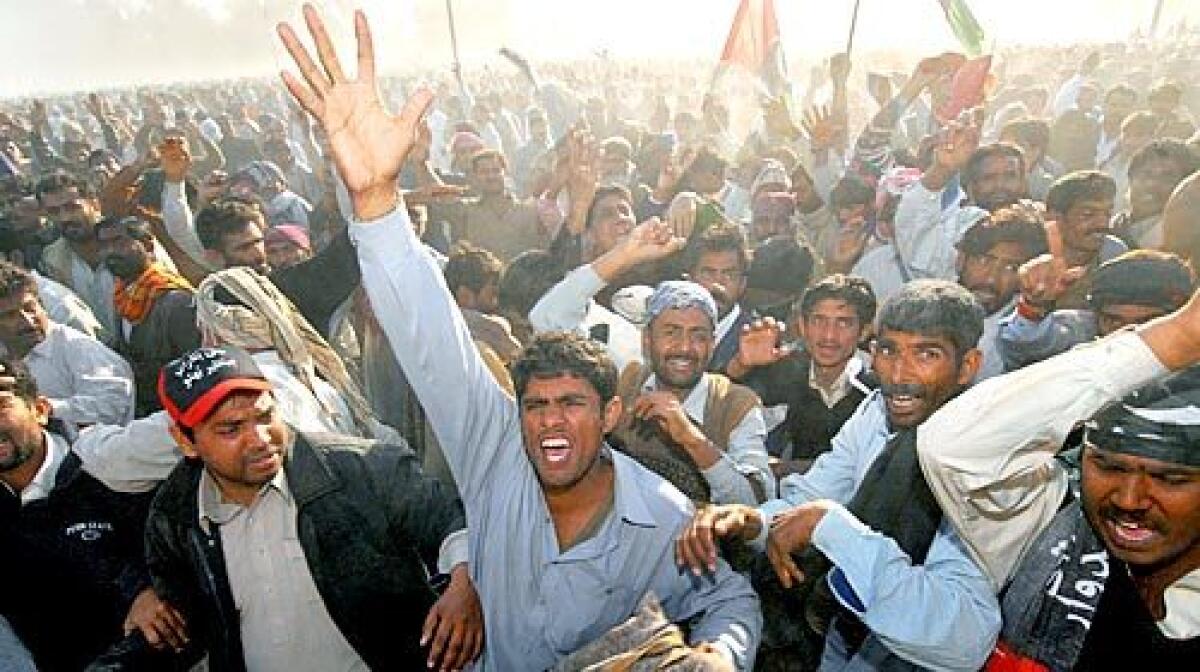U.S. gave Bhutto intelligence on dangers she faced

- Share via
WASHINGTON — In the weeks before Benazir Bhutto’s assassination, the Bush administration directly provided her with intelligence on dangers she faced from militants in Pakistan, as U.S.-backed President Pervez Musharraf resisted pressure to expand the scope of her security detail, U.S. lawmakers and other officials and Bhutto supporters said Friday.
Yet as the slain former prime minister was laid to rest, questions mounted about both the adequacy of the U.S. efforts and shortcomings on the side of the Pakistani government.
U.S. lawmakers and the popular Pakistani opposition leader’s friends charged that Musharraf had rebuffed U.S. entreaties for beefed-up security. And U.S. officials were reluctant to press Musharraf too hard, a former advisor to Bhutto said.
Nonetheless, the decision to provide intelligence to an opposition candidate in a country headed by a strong American ally reflects U.S. recognition of the gravity of the threat Bhutto faced as she sought to reclaim power in Pakistan, in part with the support of Americans who saw her as a stabilizing influence in the turbulent country.
Yet though acknowledging the danger, U.S. officials stopped short of providing direct security services, such as the private contractors they have arranged for Afghan President Hamid Karzai and for top leaders in Iraq.
Pakistani officials have rejected criticism of their security efforts, contending that they took careful precautions for Bhutto’s safety. But when she was fatally attacked Thursday, she had no police escort, only her own force of volunteer guards surrounding her car, putting their bodies between her and any attacker.
The intelligence provided to Bhutto was furnished by the U.S. Embassy in the Pakistani capital, Islamabad, according to a U.S. official who spoke on condition of anonymity. Along with information about possible threats to her, the Americans provided security advice on ways her risks could be reduced.
The U.S. official said the Americans were aware that Bhutto faced serious dangers, especially in light of an earlier attempt on her life, a bombing during her homecoming rally in Karachi on Oct. 19, in which more than 140 people were killed.
Americans also “reiterated” that the Musharraf government needed to make vigorous attempts to avert dangers to her, the official said.
Husain Haqqani, the former advisor to Bhutto, said he had entreated U.S. officials to press Musharraf to see that Bhutto had better security. But he said U.S. officials resisted deeper involvement, saying they did not want to start “micromanaging the security arrangements of another country.”
Haqqani, who is director of the Center for International Relations at Boston University, said he considered the U.S. argument legitimate. But he said that American officials have gone so far in supporting Musharraf that they should have been willing to ensure that the Pakistani president “was willing to see that Ms. Bhutto had sufficient security.”
Haqqani said Bhutto wanted to use private international security contractors for her protection. But Musharraf was unwilling to provide the necessary approvals for them to operate in Pakistan, even though Bhutto was willing to pay for them herself, he said.
Sen. Joseph R. Biden Jr. (D-Del.), who is chairman of the Senate Foreign Relations Committee and a presidential candidate, released a letter that he and two Senate colleagues wrote to Musharraf at Bhutto’s request to urge him to step up the protections.
The letter, sent soon after the October attempt on Bhutto’s life, urges that she be given “the full level of security support afforded to any former prime minister,” including bomb-proof vehicles and jamming equipment.
Biden said, however, that their appeal was unavailing and that Musharraf was “indirectly complicit” in the assassination.
“I’m not saying had she had the protection she would have lived,” Biden said in a CBS interview Friday. “But it sure bothers me that she did not have the kind of protection she needed.”
Several security analysts have questioned Bhutto’s decision to mingle with supporters while standing through the sunroof of her armored SUV after her rally Thursday. It was at that moment that shots were fired and a suicide bomber detonated a powerful explosion. Bhutto died after the attack.
Rep. Steve Israel (D-N.Y.) released an e-mail message that Bhutto had written to one of his former aides saying she feared that she could be killed because of her limited security. The former aide, Mark Siegel, had collaborated with Bhutto on a yet-to-be-published book.
Bhutto wrote in the message that if something happened to her, “I will hold Musharraf responsible.”
It was not clear whether U.S. officials began providing the information before or after the Oct. 19 attack. But the information was supplied in the context of U.S. knowledge about a network of militant organizations considered hostile to Bhutto, including some that had vowed to attempt to kill her should she return to Pakistan.
A member of those groups, Taliban leader Baitullah Mahsud, was named Friday by Pakistani officials as being responsible for Bhutto’s death. U.S. intelligence officials said they could not confirm the finding.
Israel said that he did not fault the Bush administration for Bhutto’s assassination, but that greater public pressure on Musharraf from President Bush “might have been helpful” for getting more protection.
Sen. John F. Kerry (D-Mass.), chairman of the Senate Foreign Relations subcommittee on South Asia, said this week that after the October attack, he talked to Secretary of State Condoleezza Rice about ways the administration could work with Musharraf to ensure Bhutto’s safety.
David Wade, an aide to Kerry, said the State Department had indicated it was “determined to help.”
More to Read
Sign up for Essential California
The most important California stories and recommendations in your inbox every morning.
You may occasionally receive promotional content from the Los Angeles Times.














